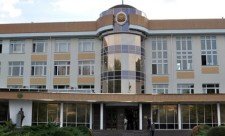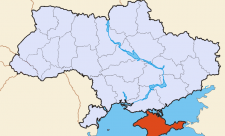 At the end of 2014 the online media “Pod pricelom” started a mini-cycle “Three migrant’s fates”, where forced migrants from Crimea representing different nations tell stories of their life that was changed by the events of that time.
At the end of 2014 the online media “Pod pricelom” started a mini-cycle “Three migrant’s fates”, where forced migrants from Crimea representing different nations tell stories of their life that was changed by the events of that time.
Andriy Nochkin, who is a chemist by profession, a Russian by birth, a Ukrainian at will, told us the final story.
– How long have you been living in Crimea? Where does your family come from?
– I have been living in Crimea since June 1992 – when I was 13 years old, my family moved from the Moscow region. I was born in Vinnytsya. My parents are the military, so we changed our place of residence many times, but Crimea was the last of them. At least, it seemed to be so before the annexation.
– Where and how did you learn the Ukrainian language so good?
– I can’t say that I know it very good – I lacked conversation practice in the past. I studied it all by myself. I began to understand the Ukrainian language thanks to television. When I moved in Crimea in 1992, there were TV-programs and movies that I watched in my native language in Russia broadcasted in Russian with Ukrainian multi-voiceover on Ukrainian TV-channels. The institution where I worked in Simferopol used the state, Ukrainian, language as the language of conducting business. That’s how I acquired the practice in written Ukrainian.
– What exactly shaped your pro-Ukrainian views? Is it a reason you had to leave Crimea?
– I lived outside Ukraine for many years. My pro-Ukrainian views were shaped little by little, but very slowly, with the help of trips around Ukraine, communications with compatriots. It wouldn’t be possible directly in Crimea. Just events in Simferopol at the end of February 2014 gave me immediate understanding how much I love my country. This happened immediately, when I didn’t see the national flag on the building of the Council of Ministers of the Autonomous Republic of Crimea. I left Crimea because of that.
– In fact, what was a reason of your movement to mainland Ukraine?
– It is understanding of the fact that I can’t see everything that is going on around me for a long time and work in Crimea without a Russian passport. But I was not going to receive it, because this procedure would be illegal.
– What didn’t you personally like in the “Russian world” that came to Crimea in March 2014?
– It is a total lie, anti-Ukrainian propaganda in unprecedented sizes and understanding that I lose freedom. I started to be afraid of expressing my position and it is not without reason as the events show.
– How do you live on the mainland now? What new things appeared in your life and what do you miss – compared to the Crimean period of life?
– I miss Ukrainian Simferopol. I wish to come back there very much, but it doesn’t temporarily exist.
– You worked in education service in Crimea for a long time – and continue to work in this area in mainland Ukraine now. How much do current aspects of your job differ from the past ones?
– To be honest, there is no difference. Actually, I do the same things as I did before. Probably, this is what helped me adapt myself quickly.
– Is it true that the education in Crimea suffered “forcible Ukrainization” that Crimeans have been frightened with for 23 years? To what extent were Crimean schools Ukrainian?
– It is ridiculous to talk about “forcible Ukrainization” of Crimea. What can we talk about if more than 90% of pupils studied in Russian, the Russian language was a compulsory school subject in Crimea, State Final Examination in Russian was always compulsory for Crimean graduating high school students. In addition to that, it should be taken into consideration that ethnic Russians are not 90% in Crimea.
– What do you know about the current education in Crimea? Who will young Crimeans become with new educational system now?
– Main circle of my friends are educators. They have different opinions about the changes that occur. But after talking with them on professional topics I can say – now there is distortion of changes in Crimea: “We refuse the old things, but can’t propose anything new.” It is difficult to say who the new educational system intends to prepare now since not enough time passed yet. But the educational component is awful. The things that I know resemble the Soviet Union for some reason, if to analyze the approaches.
– What would you advise young Crimeans, who associate their future with Ukraine, in particular, want to study in Ukraine? By the way, recently a distance learning resource for Crimeans was launched – http://educrimea.org/. What is your personal estimation of this project?
– I would advise young people who associate their future with Ukraine to take advantage of those conditions that the state creates: external studies in educational institutions located in mainland Ukraine. The law on guaranteeing the rights of citizens on occupied territories provides Crimean applicants with state-subsidized education in universities if they pass external independent testing and get the results. As for any distance educational resources – in this regard the main problem is informational isolation of Crimeans, because of which they almost have no opportunity to learn about such projects. And I don’t know how to solve this problem.
– Do you know facts of discrimination of Russians in Crimea – in particular, from Ukraine as a state? What was oppression of ethnic Russians, Russian-speaking population, which was and is insistently discussed by the Russian press now? Was it so serious that caused the forceful divestiture of Crimea from Ukraine?
– Discrimination? Of Russians? In Crimea? I’m an ethnic Russian and heard about my own discrimination in Crimea on the Russian TV, when there was agitation associated with preparations for the event that is called “referendum” by some people.
– Did you suffer troubles because of your ethnic origin in mainland Ukraine? Is it true that people in Ukraine think very poorly of Russians, in particular, Crimean Russians, as it is covered by the Russian media?
– It is as ridiculous as “forced Ukrainization” in Crimea.
– How do you see your returning to Crimea? What should happen for this?
– Blue and yellow flag should appear on public buildings of Crimea.












